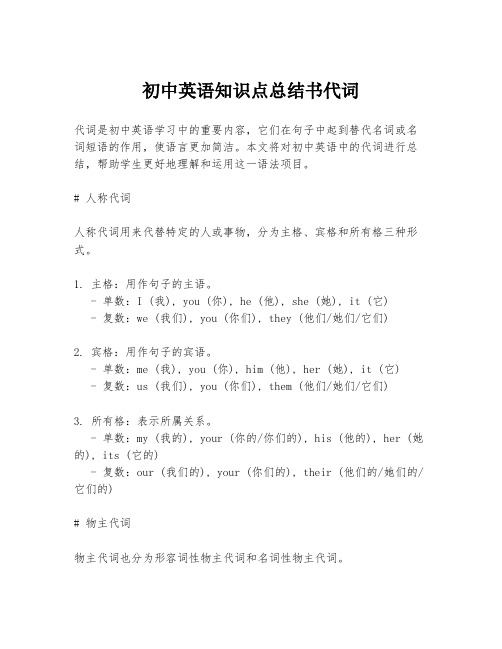初中英语代词知识点总结讲解
初中英语语法总结-代词(共15张PPT)

功能 形容词性物 作主语 主代词 名词性物主 作主语 代词 作宾语 作表语 与of连用 作定语 例句 Her father is a doctor. This is her pen. Mine is broken. Her spoken English is better than mine. That pencil is hers. The blue coat of his is very beautiful. 备注 形容词性物主代词作定语 相当于形容词 名词性物主代词在句中不 能单独作定语。如: Yours English is better than hers Your English is better than hers.
none
指代人或物 可与of连用, 谓语动词用单复数均可 回答how many/much的提问
—Sorry, we’ve got none left.对不起,一张也没有了。
—Who is absent from classes today? 今天谁没有来上课? —No one, sir.没人缺席,先生。 —Tickets for Friday?星期五的票(还有吗)? None of them is/are in the classroom. 他们当中没有一个在教室里。
Tips: 1)排列顺序: 单数:二、三、一; You, he and I are all 复数:一、二、三; We, you and they are students. 2)第一人称单数代词I , 无论 在什么地方出现都要大写。
作形式主语、形式 宾语
指前文提到的物 指不知性别的婴儿 或不确定性别的人
词条 each every 每个(强调个体) 每个(整体描述) 用法 作主语、宾语、定语、同位语 两者或两者以上 只能作定语 三者或三者以上 可与of搭配 不可与of搭配
初中英语代词讲解

My sweater is very old. I'll buy a new one. 我的毛衣旧了,我要买件新的。
Will you please get __s_o_m__e__w_a_t_e_r__ for me? 请你帮我弄点儿水好吗? (3)both, all, neither, either, any与none
使用范围
都
两者
both
三者或三者以上 all
都不 neither none
之一 either any
★every+ 基数词+ 复数名词; every+ 序数词+ 单数名词,每隔(多少)或每(多少)。 every+ other+单数名词,表示每隔“一” every+ few+复数名词.表示每隔“些/几”
如:every three days 每三天或每隔两天 every third day 每三天或每隔两天 every other day 每隔一天 every few days 相当于汉语的“隔些日子”
The apples in the box are different from those on the table. 盒子里的苹果与桌上的苹果不同。
Mingo
考点五 不定代词
1.定义 不指明代替任何特定名词或形容词的代词叫做不定代词。 不定代词大都可以代替名词和形容词。多数可以作主语、宾语、 表语或定语。常见的不定代词有:some, any, no, none, one, all, every, each, other, another, either, neither, both, many, much, (a)few, (a)little, a lot of, lots of以及some, any, no, every与thing, body或one构成的复合不定代词。 2.常用的意义相近的不定代词之间的辨析 (1)few, a few, little与a little
中考代词知识点总结

中考代词知识点总结一、人称代词人称代词用来表示说话人、听话人和与说话人或听话人有关的人或事物。
在中考英语考试中,人称代词的使用是非常常见的。
1. 主格形式:I, you, he, she, it, we, they。
例如:I am a student.You are my friend.He is a teacher.She is my sister.It is a cat.We are in the same class.They are good students.2. 宾格形式:me, you, him, her, it, us, them。
例如:He likes me.I see you.We help him.She loves her.It follows it.They call us.I miss them.3. 形容词性物主代词:my, your, his, her, its, our, their。
例如:This is my book.Is this your dog?That is his bike.Her name is Lily.Its color is yellow.Our teacher is strict.Their parents are doctors.4. 名词性物主代词:mine, yours, his, hers, its, ours, theirs。
例如:This book is mine.Is this dog yours?The bike is his.The cat is hers.The house is ours.The toys are theirs.5. 反身代词:myself, yourself, himself, herself, itself, ourselves, themselves。
例如:I see myself in the mirror.You should do it yourself.He hurt himself.She enjoys herself.It cleans itself.We find ourselves lost.They talk to themselves.二、指示代词指示代词用来指示人或物,常见的指示代词有this, that, these, those等。
代词知识点详解(14张PPT)初中英语专题复习课件

enjoy oneself 玩得开心 help oneself to 随便(吃、喝) lose oneself in... 沉浸在……之中
反身代词
➢ 例 Help
to some fish, Jim.
A. himself
B. herself
C. yourself
➢ 解析 句意:吉姆,随便吃些鱼吧。考查短语help oneself to sth."随便吃/
指代离自己较近的人或物 this, these
指代离自己较远的人或 物 比较结构中代替前面提 到的名词,以免重复
that, those
疑问 代词
指示 代词
不定 代词
代词
人称 代词
物主 代词
反身 代词
语法图解
someone/somebody/something, anyone/anybody/anything, nobody/nothing everyone/everybody/everything等
many/much, few/a few, little/a little, other/the other/another/others, some/any, either/neither/both/all等
复合 不定 代词
普通 不定 代词
疑问 代词
指示 代词
不定 代词
代词
人称 代词
物主 代词
反身 代词
人称代词与物主代词
区分 人称代词
用法
成分
指代人或物 作主语(主格),作宾语(宾格)
物主代词
表示所有关系
形容词性物主代词作定语 名词性物主代词=形容词性物主代词+名词,具有名 词特性,可作主语、宾语、宾补
初中英语知识点总结书代词

初中英语知识点总结书代词代词是初中英语学习中的重要内容,它们在句子中起到替代名词或名词短语的作用,使语言更加简洁。
本文将对初中英语中的代词进行总结,帮助学生更好地理解和运用这一语法项目。
# 人称代词人称代词用来代替特定的人或事物,分为主格、宾格和所有格三种形式。
1. 主格:用作句子的主语。
- 单数:I (我), you (你), he (他), she (她), it (它)- 复数:we (我们), you (你们), they (他们/她们/它们)2. 宾格:用作句子的宾语。
- 单数:me (我), you (你), him (他), her (她), it (它)- 复数:us (我们), you (你们), them (他们/她们/它们)3. 所有格:表示所属关系。
- 单数:my (我的), your (你的/你们的), his (他的), her (她的), its (它的)- 复数:our (我们的), your (你们的), their (他们的/她们的/它们的)# 物主代词物主代词也分为形容词性物主代词和名词性物主代词。
1. 形容词性物主代词:用来修饰名词,表示某物属于某人。
- 单数:my (我的), your (你的), his (他的), her (她的),its (它的)- 复数:our (我们的), your (你们的), their (他们的/她们的/它们的)2. 名词性物主代词:在句子中可以独立使用,通常用于回答问题或在没有后续名词的情况下。
- 单数:mine (我的), yours (你的), his (他的), hers (她的), its (它的)- 复数:ours (我们的), yours (你们的), theirs (他们的/她们的/它们的)# 反身代词反身代词用来指回句中的主语,表示动作反射到动作执行者自己身上。
- myself (我自己), yourself (你自己), himself (他自己), herself (她自己), itself (它自己)- ourselves (我们自己), yourselves (你们自己), themselves (他们/她们/它们自己)# 指示代词指示代词用来指示或标识人或物。
初中英语知识点归纳代词的种类和用法

初中英语知识点归纳代词的种类和用法代词是英语语法中的重要部分,用于代替名词或名词短语,以避免重复使用。
代词可以分为人称代词、物主代词、指示代词、疑问代词、不定代词和相互代词等多种类型。
本文将对这些代词的种类和用法进行归纳总结。
一、人称代词(Personal Pronouns)人称代词分为主格和宾格两种形式。
主格用在动词前做主语,宾格用在动词后做宾语。
1. 主格形式:I(我)、you(你)、he(他)、she(她)、it (它)、we(我们)、they(他们/她们/它们)例句:He is my brother.(他是我弟弟。
)2. 宾格形式:me(我)、you(你)、him(他)、her(她)、it (它)、us(我们)、them(他们/她们/它们)例句:Please help me.(请帮助我。
)二、物主代词(Possessive Pronouns)物主代词用来表示所有关系,替代名词所表示的具体人或物的所有物。
1. 形容词性物主代词(Adjective Possessive Pronouns):my(我的)、your(你的)、his(他的)、her(她的)、its(它的)、our(我们的)、their(他们的/她们的/它们的)例句:Is this your book?(这是你的书吗?)2. 名词性物主代词(Substantive Possessive Pronouns):mine(我的)、yours(你的)、his(他的)、hers(她的)、ours(我们的)、theirs(他们的/她们的/它们的)例句:This is mine.(这是我的。
)三、指示代词(Demonstrative Pronouns)指示代词用来指示特定的人或物,距离说话人近或远。
1. this(这个)、that(那个):单数形式例句:This is my house.(这是我的房子。
)例句:That is his car.(那是他的车。
初中英语知识点归纳人称代词和物主代词的用法
初中英语知识点归纳人称代词和物主代词的用法初中英语知识点归纳: 人称代词和物主代词的用法人称代词(Personal Pronouns)是用来代替特定人称的词语。
人称代词分为主格、宾格和反身代词。
物主代词(Possessive Pronouns)则用于表示所有权或归属关系。
在学习英语的过程中,准确理解和使用人称代词和物主代词是非常重要的。
本文将对初中英语中人称代词和物主代词的用法进行归纳总结。
一、人称代词的用法1. 主格人称代词(Subject Pronouns)主格人称代词用于代替句子的主语,常见的主格人称代词包括:I (我)、you(你)、he(他)、she(她)、it(它)、we(我们)、they(他们/她们/它们)。
例句:- I am a student.(我是一名学生。
)- You are my best friend.(你是我最好的朋友。
)- He is a doctor.(他是一名医生。
)- She is playing the piano.(她正在弹钢琴。
)- It is a dog.(它是一只狗。
)- We are going to the park.(我们要去公园。
)- They are watching a movie.(他们正在看电影。
)2. 宾格人称代词(Object Pronouns)宾格人称代词用于代替句子中的宾语,常见的宾格人称代词包括:me(我)、you(你)、him(他)、her(她)、it(它)、us(我们)、them(他们/她们/它们)。
例句:- She gave me a present.(她给了我一个礼物。
)- Can you lend me your pen?(你能借给我你的笔吗?)- I saw him at the park.(我在公园看到了他。
)- The cat is sleeping. Don't disturb it.(那只猫正在睡觉,别吵到它。
初中英语语法代词讲解
初中英语语法代词讲解Newly compiled on November 23, 2020初中英语语法代词代词:为了避免重复而用来代替其他词的词。
种类:1) 人称 2) 物主 3) 反身4) 指示 5)不定6) 疑问7) 相互代词:each other, one another互相,其所有格加-’s8) 关系代词:which, who,that,whom,whose等引导定语从句9) 连接代词:who, whom, whose, what, which, whatever, whichever, whoever, whomever10)替代词:one(单数), ones(复数)用于替代前面出现的同类事物。
但ones必须和形容词连用。
如果替代的名词时无形容词在前,则用some, any,而不用ones。
如:Have you bought any rulers Yes,I 've bought some.一、人称代词1.人称代词的形式2.人称代词的句法功能3.人称代词的排列顺序(单数231,复数123)当两个以上的人称代词一起作主语时,单数按二、三、一人称排列(即you, he / she, I);复数按一、二、三人称排列(即we, you, they)。
但是如果做错了事需要承担责任时,要把说话人(I)放在第一位。
如:It was I and John that made her angry. 是我和约翰惹她生气了。
二、物主代词1.物主代词的形式2.物主代词的基本用法3.物主代词的特殊用法在双重所有格中只能用名词性物主代词。
如:我的一个朋友a friend of mine ,她的一个同学 a classmate of hers , each brother of his.三、反身代词1.反身代词的形式反身代词又叫自身代词,表示动作返回到动作发出者本身。
2.反身代词的句法功能3.由反身代词构成的习惯用语①help oneself to 随便吃……②come to oneself 苏醒过来,醒悟,恢复知觉③dress oneself 自己穿衣服④say to oneself 自言自语⑤enjoy oneself 玩得开心⑥lose oneself in迷路于,全神贯注于…之中,消失于⑦teach oneself 自学⑧look after oneself ⑨by oneself 亲自learn……by oneself 自学…leave one by oneself 把某人单独留下hurt oneself 伤了自己make yourself/yourselves at home 不必拘束四、指示代词1. that 用来代替前面提到的不可数名词,those代替复数名词。
初中英语代词语法知识讲解
himself, herself, itself
复数
ourselves
yourselves
themselves
句法功能
作同位语: 可以做主语或宾语的同位语, 起强调作用。此时反身代词要重读,位置
也比较灵活,可放在主语、宾语之后,也可位于句尾。
I'm afraid I can't help you, and you will have to do it yourself.
作主语?littlealittlefew和和afew区别意义句法功能用法与of搭配代词little几乎没有主语宾语表语定语或状语alittle可修饰比较级修饰或代替不可数名词of后为特指的不可数名词或italittle有一点few没有几个主语宾语表语或定语修饰或代替可数名词复数of后为特指的可数名词复数或themyouusafew有几个pleaseaddalittlesugartothecoffee
one 可以作主语、宾语、表语等,
其复数形式为 ones ,所有格形式为 one's ,反身代词为 oneself.
A. 泛指“人”“一个人”“人们”,表示包括自己在内的总体。这种用法中可以出现
one's 和 oneself 与之呼应。 One has to do one's best. 人总要尽力而为。
如果需承担责任,说话者则把第一人称放在第一位。
You ,she, and I should work together and play together.
I and Li Ming broke the window.
B. 人称代词单独使用时,常用宾格而不是主格。
-I'd like to stay here for another week.
初中英语语法基础——代词知识点归纳和用法辨析 (附同步练习和答案)
初中英语语法基础——代词知识点归纳及用法辨析一、分类:英语中常见的代词主要分为人称代词、物主代词、反身代词、指示代词、关系代词、疑问代词、连接代词和不定代词等等。
二、人称代词:人称代词代替人和事物的名称,分为主格和宾格两种形式。
1、主格用来作句子的主语、表语。
2、宾格用来作及物动词或者介词的宾语。
3、人称代词作表语或者放在比较状语从句连词than或as之后时,可以用主格形式,也可以用宾格形式,口语中大多用宾格。
如:--Who is it?(是谁?) –It’s I/me.(是我。
)4. 三个不同人称同时出现,或者主语中包含“我”时,按照“you→he→I”的顺序表达。
5. 人称代词it除了可以指人指物之外,还可以表示“时间、天气、温度、距离、情况”等含义, 还可以作“非人称代词”使用,替代作主语或者宾语的不定式、动名词或者名词性从句。
三、物主代词:说明事物所属关系的代词,分为形容词性和名词性两种。
1、形容词性物主代词只能作句子中名词的修饰语,后面要跟名词。
2、名词性物主代词相当于名词,既代替事物又表明所属关系,在句子中往往独立地作主语、宾语或者表语,后面千万不可以跟名词。
3、“of + 名词性物主代词”称为双重所有格,作定语时放在名词的后面。
四、反身代词:表示谓语的动作与主语有关或者宾语补足语的动作与宾语有关。
在句中作宾语或同位语五、指示代词:既可以单独使用做句子的主语、宾语或表语,也可以作定语修饰名词。
有this, that, these, those【补充】:①this ,that 可代替句子或句子的一个部分,that代替前面提到的句子而this代替下面提到的句子.He had a bad cold ,that is why he didn’t come .②在电话用语中,this 代替自己,而that 代替对方.This is Tom speaking . Who is that ?③英语中用来代替前面出现的人或物, 常用that和those,以避免重复.that代替可数名词的单数或不可数名词. those 代替复数名词.六、关系代词:用来引导定语从句的代词叫关系代词。
- 1、下载文档前请自行甄别文档内容的完整性,平台不提供额外的编辑、内容补充、找答案等附加服务。
- 2、"仅部分预览"的文档,不可在线预览部分如存在完整性等问题,可反馈申请退款(可完整预览的文档不适用该条件!)。
- 3、如文档侵犯您的权益,请联系客服反馈,我们会尽快为您处理(人工客服工作时间:9:00-18:30)。
Grammar: 学习目标1. 复习人称代词的主格、宾格;2. 掌握形容词性、名词性物主代词的用法;3. 掌握重点不定代词的用法;精讲提升(1)人称代词①人称代词作主语时用主格,作宾语时用宾格:He (主语) is a great writer.They all like him(宾语)very much.②she可以用来代表国家,船只,大地,月亮等:China loves her people.③在并列的主语中,I 总放在最后:Xiao Y u and I are good friends.(2)物主代词①形容词型的物主代词只能作定语,如:my brother.②名词型的物主代词有充当名词的作用:Whose dictionary is this? ------ It’s mine.Ours is a big family.You may use my pen. I’ll use hers.(3) 反身代词I can’t express (表达) myself in English.That poor boy was myself.重要补充:① 为了强调语气,表示“亲自”。
如:He says he’ll do it himself.① 反身代词常和某些动词连用,如:I hope you’ll enjoy yourselves. 希望你们玩得开心。
Please help yourself to some fish. 请吃点鱼。
(4)不定代词Some/any:① some用于陈述句中;any用于疑问句和否定句。
① same也用在“请求、建议、反问”等含义的疑问句中,以期待得到对方肯定的回答。
Would you want some coffee?Didn’t he give you some books? 难道他没有给你一些书?Both/all① both表示“两者都”;both A and B① all表示“所有都”,三者或三者以上Other与another① Other具有代词和形容词性质,即可指人,也可指物。
Other表示“另外的,其他的”,the other表示两者中的另一个; t he others 表示“在一个范围内的其他全部”,others用于泛指,表示“其余的人或物。
”① another具有代词性质,即可指人也可指物,表示“泛指的另一个,而不是两者中的另一个。
”Few与a few, little与a littleFew, a few用来代替或修饰可数名词。
Few表示否定意义,译为“没几个”,a few表示肯定意义,译为“一些,几个。
”little与a little用来代替或修饰不可数名词。
Little表示否定意义,a little表示肯定意义。
随堂练I. 用适当的人称代词替代下列单词词组。
Jane _________Tom _________Miss Grant’s _________Her father’s __________the pupils __________Mary’scar __________You and me __________my friend and I __________His car __________【答案】she,he,her,his,they,it,us,we,itII. Fill in the blanks with the proper pronouns. (用合适的代词填空。
)1.Are you going there by __________. (you)2.__________ (she) ruler is long.3.This is __________ (you) room.4.Can you do __________ (I) a favor?5.Let __________ (I) read the poem for __________. (yours)【答案】1. yourself,2. Her,3. your,4. me,5. me,youIII. Choose the best answer.Other等练习1. —What do you think of the cake? —It’s nice. I’d like to have ________.A. some otherB. anotherC. othersD. other2. Young people may grow quickly in some ways and more slowly in ________.A. the otherB. anotherC. othersD. these others3. Some people like to stay at home on Sunday but ________ like to go to the cinema.A. anotherB. otherC. othersD. other one4. Changde is a beautiful city and we’ve decided to stay for ________two weeks.A. anotherB. otherC. the otherD. other’s5. I got the story from Tom and ________ people who had worked with him.A. every otherB. many othersC. some otherD. other than【答案】B B C A CFew, a few, little, a little专项练习1. I’m not thirsty. I only want ________ orange juice.2. There’s still ________ milk in your glass. Please finish it off.3. I had ________ rolls for breakfast.4. A: What would you like?B: ________ chicken nuggets and a bowl of rice.5. A: How many chicken legs do you want?B: Just ________. I’m not too hungry.A: What about cola?B: ________ will do.6. We have only ________ people for the party.7. There’s ________ ink in my pen.8. Please have an apple. There are ________ in the fruit bowls.①1. Shanghai Waihuan Tunnel is already open to traffic, so it will take us___________ time to go to Pudong International Airport.A. a fewB. fewerC. a littleD. less①2. In order to keep healthy, you should eat _______ fast food, _______fresh vegetables and take enough exerciseA. fewer/ fewerB. less/ moreC. fewer/ moreD. less/ less①3. Can we do our work better with _________ money and ______ people?A. less/ fewB. less/ fewerC. little/ lessD. few/ less①4. There is _____ ink in my pen. Would you give me______?A. little/ a littleB. a little/ littleC. few/ a fewD. a few/ few【答案】1. some 2. a little 3. a little 4. Some 5. a few, A little 6. some 7. little / a little 8. someSome,any专项练习1. There are ________ students in the playground. They are playing football.2. I don’t want ________food. I’m not too hungry.3. I want ________bread, but I don’t want ________rice.4. A: Would you like to have ________ orange juice?B: Yes, I’d like to. Thank you.5. I’m thirsty. I’d like to have ________ water.6. Is there ________chicken for me?7. I haven’t ________ fruit. I must buy ________.8. Help yourselves to ________ fish, children.【答案】1. some 2. some 3. some, any 4. some 5. some 6. any 7. any…some 8. some。
